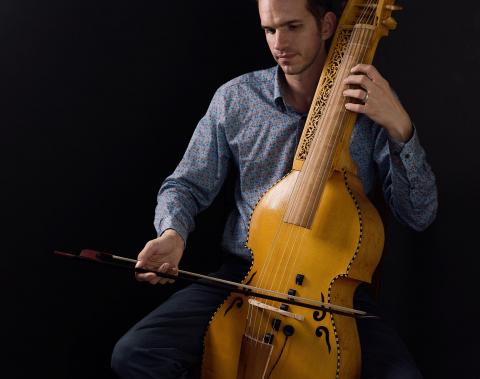You’ve Probably Never Heard This Instrument. Matthew Baker Wants to Change That.

Matthew Baker, instructor at Berklee's campus in Valencia, Spain, plays the baryton.
Photo by Alex Baker
Sometimes, innovation begins with a look to the past.
In 2004, before he joined the faculty at Berklee’s campus in Valencia, Spain, bassist Matthew Baker encountered a series of duos written by 18th-century Austrian composer Franz Josef Haydn for a now-obscure stringed instrument known as the baryton. While he was rearranging the pieces for his double-bass-and-cello duo, something in the music struck him. “I fell in love with the pieces,” he said, “which lit the spark that made me want to find out more.”
But to start: what is this instrument? "The baryton is a very curious instrument,” Baker says. “In essence it's a viola da gamba [a more common stringed instrument favored by Renaissance and Baroque composers] but with 10 strings in the back that you can play with your left thumb (while playing the front strings) or just let resonate.” Or, in other words: “Imagine a small cello with a hidden harp attached to the back and you will have a good idea."
Over the decade that followed his initial work on those duets, Baker kept returning to Haydn’s baryton compositions and researching the instrument, and that spark of curiosity kept growing until finally, in 2017, he sought lessons in the instrument from the only baryton player in Spain, José Manuel Hernández. "I think I imagined that might satisfy my curiosity,” he says, "but it just made me want to start working seriously on the instrument right then and there.” He eventually bought his teacher's own baryton, and has been deepening his study of the instrument ever since.
“I’ve seen the baryton as a wonderful instrument to music as diverse as jazz, world, electronic, and flamenco, not to mention many other styles."
—Matthew Baker, instructor, Bass Department
Three years into Baker’s baryton explorations, his curiosity has led him down still more fruitful and surprising avenues. In 2018, Baker joined with colleagues from the opera orchestra of Valencia's Palau de les Arts (in which he plays double bass) to form the Valencia Baryton Project. The group "is dedicated to performing the works written for the baryton, which mostly consist of the nearly 160 works by Haydn as well as a scattering of lesser-known composers such as Tomasini and Lidl,” Baker says. "We are a trio at the heart of it, but can and have expanded to cover quintets, octets, and even invited another barytonist to perform the baryton duos." Since its founding, the Valencia Baryton Project has brought the instrument’s forgotten sound to audiences across Spain. This summer the group will take that sound on tour internationally in Europe and the Americas, and 2020 will also see the release of their first album, a selection of six neglected baryton trios by Haydn, on Naxos Records.
The Valencia Baryton Project performs one of Haydn's underappreciated baryton trios:
Beyond the potential to revive important compositions from the instrument’s heyday, Baker has begun to explore what the baryton might bring to more modern contexts. “Being the jazz and contemporary musician I am, I couldn’t help but imagine its sound in settings pretty far removed from the original scope of music for the instrument,” he says. “Overall, I’ve seen the baryton as a wonderful instrument to music as diverse as jazz, world, electronic, and flamenco, not to mention many other styles.”
Most recently, Baker has begun working with pianist Baptiste Bailly and producer IMGL (Gianluca Tavaroli) on a modern jazz trio featuring baryton, keys, and electronic production. The newly formed trio's first song, “L’arbre aux secrets,” released this month, showcases the instrument’s distinct timbre and the versatility of its plucked and bowed styles, but also hints toward a whole world of unexplored sonic terrain. “Baptiste was playing around with using the Moog [synthesizer] on this song, and I mentioned going full electronic for a third component of the group,” he says of the tracks’ origins. "Asking Gianluca Tavaroli, my great friend and a colleague I have huge respect for, was the obvious step."
Listen to Baker's new jazz trio's debut single, featuring the baryton, "L'arbre aux secrets":
As is the case with most good teachers, Baker, now an instructor in the Bass Department at Berklee Valencia, also finds ways to bring the insights of his personal study into the classroom. “Working on another instrument other than your principal instrument always opens the mind to other possibilities both musically and technically,” he says. “It’s given me new ideas on approaches to melodic lines, bowed work, and techniques that we in the bass world don’t always incorporate.” But the biggest way it has affected his teaching? “I’ve had to go back to square one and teach myself a whole new instrument from scratch. I’ve been able to use this experience to really empathize with my students and what they are going through."
